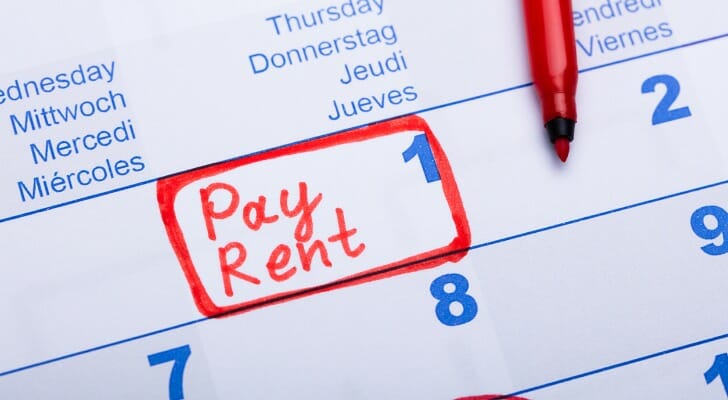In response to the financial meltdown sparked by the coronavirus pandemic, Congress passed a historic $2 trillion stimulus package and President Trump signed it into law on March 27, 2020. The Coronavirus Aid, Relief, and Economic Security (CARES) Act included several provisions protecting homeowners and renters.
That meant that if you lost your job due to the coronavirus pandemic, you might have been able to suspend your mortgage payments for up to 180 days without penalty. You might also have qualified for foreclosure and eviction protection during this time. In addition, certain renters were also protected from eviction if they could not pay their rent because of the pandemic. Relief came in the form of federal, state and private sector programs designed to help those suffering the economic fallout of COVID-19.
But many of the CARES Act benefits were set to expire at the end of the year, unless Washington took action to extend those benefits. Here’s an update on where things stand with Congress and the president and some of the ways the CARES Act helped homeowners and renters.
If you have a mortgage, make sure you integrate its payments into your overall financial plan. Talk to a financial advisor today.
On Dec. 21 Congress passed a $900 billion second stimulus package for COVID-19 relief that would provide numerous benefits, one of which is a one-month extension of a CDC order that provided eviction protections during the pandemic. That protection was set to expire Dec. 31.
However, the day after passage of the bill, Trump demanded that Congress send him a new bill, one that increased to $2,000 the $600 in direct aid the bill called for. While the Democrat-controlled House of Representatives responded to Trump’s demand with plans to vote Christmas Eve on just such an amended bill it was not immediately clear how the Republican-controlled Senate would respond.
Mortgage Relief in the CARES Act
Here is a summary of what the CARES Act provided. It stated that anyone with a federally backed mortgage who is experiencing financial hardship due to the coronavirus could request forbearance for up to 180 days. You did not need to prove your financial hardship; you only had to attest it. If needed, you could request an additional 180 days.
That said, only homeowners who lost their jobs because of the coronavirus were eligible for federally backed mortgage relief. “If people do have jobs, we expect those people to continue paying mortgages,” Treasury Secretary Steven Mnuchin said on CNBC.
Forbearance is a time when you can suspend your monthly payments on federally-backed mortgages. The new law prohibits loan servicers or lenders from charging additional interest, fees or other penalties during forbearance. These rules cover property ranging from single-family homes to fourplexes.
Also, lenders of federally backed mortgages were prohibited from launching foreclosures for a 60-day period, beginning March 18.
To be eligible for mortgage relief under the CARES Act, your loan must have been federally owned or backed by one of these federal agencies or entities:
- Fannie Mae (Homeready program)
- Freddie Mac
- U.S. Department of Housing and Urban Development (USDA loans)
- Federal Housing Administration (FHA loans)
- U.S. Department of Veteran Affairs (VA loans)
While the government backed these mortgages, they’re provided to consumers by federally-approved lenders. You had to contact your loan servicer or lender directly and request forbearance. And due to the circumstances, you may simply have needed to state that you’d lost your job and were experiencing financial hardship because of the COVID-19 outbreak.
Those who owned multi-family homes with federally-backed mortgages could request forbearance of up to 30-days with the option of two 30-day extensions. However, they were more likely to secure it if they were in good standing with the lender as of Feb. 1, but because of the pandemic faced financial hardship.
The bill also provided indirect relief to some renters. If a landlord owned a property through a federally-backed mortgage, that person wasn’t allowed to evict tenants solely for their failure to pay rent for a 120-day period, starting March 27, 2020. These landlords were also prohibited from charging penalties to such tenants for failing to pay rent.
Mortgage giants Fannie Mae and Freddie Mac back some multi-family home mortgages. They’re overseen by the Federal Housing Finance Agency (FHFA).
Mortgage Relief Through Fannie Mae and Freddie Mac

Through mortgage industry giants Fannie Mae and Freddie Mac, the federal government extended mortgage forbearance to homeowners affected by the coronavirus. These two agencies back about half of mortgages issued in the U.S.
Forbearance means you can temporarily reduce or pause your monthly payments for an initial 180 days. You have the right to request an additional 180 days once. Interest will accrue during this time frame. But you’d get the following benefits:
- Zero late fees
- No delinquency reports sent to the credit bureaus
- No foreclosure or legal proceedings
Mortgage forbearance isn’t automatic, however. You needed to contact your loan servicer to request forbearance. Due to the severity of the situation, you may just have needed to tell your loan servicer you’ve been economically affected by the coronavirus.
Visit the FHFA website for the latest updates.
FHA Mortgage Relief
On March 18, 2020, President Trump ordered 60-day the suspension of evictions and foreclosures on single-family homes covered by mortgages insured by the FHA.
So if you’re having trouble paying an FHA loan due to financial hardship linked to the coronavirus, contact your loan servicer immediately. You may get forbearance. Keep in mind that the executive order also suspends foreclosures currently in progress.
VA Mortgage Relief
The Department of Veterans Affairs is urging approved lenders to ease the financial burden on borrowers affected by the COVID-19 pandemic. The VA is asking these lenders to do the following:
- Reduce or eliminate late fees
- Terminate reporting delinquent loans to the credit bureaus
- Take all action to prevent foreclosures
Some of the larger mortgage lenders working with the VA have already rolled out some relief efforts. If you have a VA loan or similar mortgage, contact your lender directly to discuss your options.
Coronavirus Relief for Renters

While many states and counties have moved to temporary prohibit or limit evictions, there is no rent freeze policy at the federal level or state. However, a bill calling for a 90-day suspension of rent payments for those affected by the coronavirus was introduced in the New York State Senate on March 23, 2020.
Still, some renters may have indirect relief through Fannie Mae and Freddie Mac. Landlords who own multi-family homes purchased with mortgages backed by these organizations are being offered forbearance, on the condition they cease evictions for tenants who can’t pay rent due to financial hardship caused by the coronavirus. You can learn more about this policy by visiting the official website of the FHFA.
State Mortgage Relief Programs
Many states are taking it upon themselves to provide various mortgage and rent relief programs to residents. Here’s a breakdown of what relief programs states are offering:
New York
On March 19, New York Governor Andrew Cuomo announced the state will suspend mortgage payments for up to 90 days for eligible homeowners, including those who lost jobs because of the coronavirus.
California
California is allowing cities and counties to temporarily cease evictions of homeowners and renters affected by the coronavirus.
Indiana
No evictions or foreclosure proceedings are allowed during the Indiana state of emergency, which is set to end April 5, 2020. The state extended these rules for an additional 30 days.
Kansas
Kansas is prohibiting foreclosures and evictions up until at least May 1, 2020.
Kentucky
Kentucky has prohibited evictions up until April 10, 2020. This rule doesn’t apply to cases already sent to the Sheriff’s office.
Delaware
All tenant and landlord proceedings in the state of Delaware are prohibited until after May 1, 2020.
North Carolina
As of March 16, North Carolina suspended eviction and foreclosure hearings for 30 days.
Virginia
Virginia is pushing lenders to extend hardship forbearances while protecting consumers from credit reporting.
Louisiana
Louisiana has suspended foreclosures and evictions.
Pennsylvania
Pennsylvania has prohibited evictions and foreclosures until April 3, 2020.
New Hampshire
New Hampshire has terminated foreclosures and evictions indefinitely.
New Jersey
Under its state of emergency, New Jersey has suspended foreclosures and evictions — a measure that will last no longer than two months.
Texas
Texas suspended foreclosures and evictions for COVID-19 affected residents under any program administered by The Texas Department of Housing and Community Affairs.
Most of these state rules would be reviewed and applied on a case-by-case basis. So check with your state housing department for the latest details.
Other states may have their own programs as well. For a full overview, check out SmartAsset’s state-by-state overview.
Lenders Easing Mortgage Rules Amid the Coronavirus Pandemic
Several banks and other mortgage lenders are taking their own relief efforts to help borrowers financially hit by COVID-19. Check out some of these efforts below:
Ally Bank
Ally Bank is allowing mortgage borrowers to suspend payments for up to 120 days. Interest will accrue, but the bank won’t charge late fees.
Bank of America
Bank of America announced it will temporarily suspend mortgage payments for eligible borrowers. Contact the bank for specific details.
Quicken Loans
Quicken Loans is offering temporary forbearance to qualifying borrowers. Those with conventional loans won’t have their credit scores impacted during the forbearance period.
Bottom Line
If your lender approved temporary forbearance, keep in mind it’s not loan forgiveness. Your mortgage doesn’t disappear. In most cases, interest continues building on your loan balance. And when the forbearance lifts, you must work with your lender to devise a new payment plan that will keep you in good standing.
Times of crisis are open season for scammers. So beware phony mortgage relief programs. Never submit any personal information until you’ve verified with your lender the legitimacy of the entity contacting you.
Tips for Managing Your Mortgage Payments
- The introduction of a mortgage into your financial life can have major effects. A financial advisor can help you build a financial plan to account for your mortgage payments. SmartAsset’s free tool makes finding an advisor easy, as it pairs you with suitable options in your area. Get started now.
- Many states across the country are sponsoring various mortgage relief programs and offer homeowners assistance throughout the year, not just in times of crisis.
Photo credit: ©iStock.com/LucaLorenzelli, ©iStock.com/Natee Meepian, ©iStock.com/AndreyPopov
